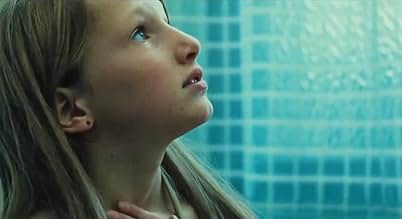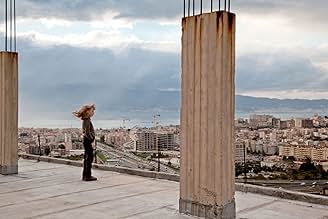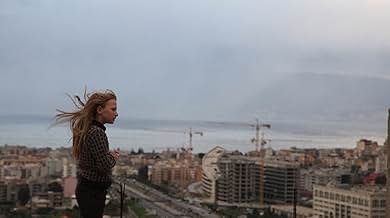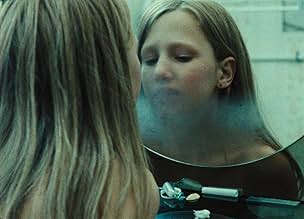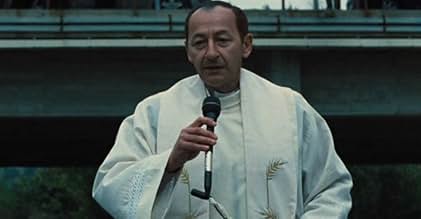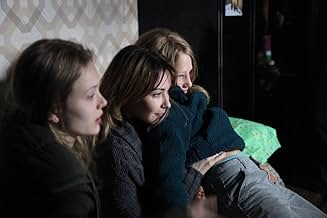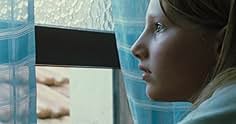IMDb रेटिंग
6.8/10
2.3 हज़ार
आपकी रेटिंग
अपनी भाषा में प्लॉट जोड़ेंThirteen year-old Marta has recently moved back to southern Italy with her mother and older sister and struggles to find her place, restlessly testing the boundaries of an unfamiliar city an... सभी पढ़ेंThirteen year-old Marta has recently moved back to southern Italy with her mother and older sister and struggles to find her place, restlessly testing the boundaries of an unfamiliar city and the catechism of the Catholic church.Thirteen year-old Marta has recently moved back to southern Italy with her mother and older sister and struggles to find her place, restlessly testing the boundaries of an unfamiliar city and the catechism of the Catholic church.
- निर्देशक
- लेखक
- स्टार
- पुरस्कार
- 10 जीत और कुल 10 नामांकन
Yile Yara Vianello
- Marta Ventura
- (as Yle Vianello)
Giovanni Federico
- Nino
- (as Gianni Federico)
Monia Alfieri
- Donatella
- (as Monica Alfieri)
फ़ीचर्ड समीक्षाएं
Alice Rohrwacher cannot disappoint.
If like myself, you have seen her latter films (and don't skip the documentary La Futura) - and are wonder-ing about seeing this film, rest assured even in her debut, you shall be rewarded.
This film is a little slower or more subtle perhaps than the others. Rohrwacher has not yet put her full faith in nature, but there are gusts of winds that sort of blow the (what else) young teenage female heroine through the town she has recently moved to.
In contrast to the church's literal formula, young Marta goes on her own pilgrimage. She is a misfit both in catechism and her sister's borrowed clothing. The viewer may have to be gentle with her and this film , but ultimately there is a lot going on. Trust in her, as in all of Rohrwacher's adolescent savants. The wisdom of the naif.
I feel like this could pair well with the more grandiose "The Mission." The film is not so much about religion, though it can feel that way. To me the tale is more about abandonment.
Amazing how the director connects a famous phrase from the Bible, Christ's cry - in Greek as part of the aforementioned formula, to the town of Roghudi Vecchio. There is also the subplot of Santa (the real spirit of the small church) and Don Mario (definitely the corporate/corporeal side) - and Santa fearing his abandoning.
There are religious tropes that tantalize through-out, walking on water, loaves and fishes, the blood of innocents - but do not be led into the temptation of trope tagging, instead enjoy the beauty of doubt, and the wrestling with abandonment.
Well that, and Rohrwacher's portrayal of adolescence as somehow more knowing and more flexibly real than rigid structures of catechism and capitalism and the other isms Rohrwacher so strongly distrusts.
If like myself, you have seen her latter films (and don't skip the documentary La Futura) - and are wonder-ing about seeing this film, rest assured even in her debut, you shall be rewarded.
This film is a little slower or more subtle perhaps than the others. Rohrwacher has not yet put her full faith in nature, but there are gusts of winds that sort of blow the (what else) young teenage female heroine through the town she has recently moved to.
In contrast to the church's literal formula, young Marta goes on her own pilgrimage. She is a misfit both in catechism and her sister's borrowed clothing. The viewer may have to be gentle with her and this film , but ultimately there is a lot going on. Trust in her, as in all of Rohrwacher's adolescent savants. The wisdom of the naif.
I feel like this could pair well with the more grandiose "The Mission." The film is not so much about religion, though it can feel that way. To me the tale is more about abandonment.
Amazing how the director connects a famous phrase from the Bible, Christ's cry - in Greek as part of the aforementioned formula, to the town of Roghudi Vecchio. There is also the subplot of Santa (the real spirit of the small church) and Don Mario (definitely the corporate/corporeal side) - and Santa fearing his abandoning.
There are religious tropes that tantalize through-out, walking on water, loaves and fishes, the blood of innocents - but do not be led into the temptation of trope tagging, instead enjoy the beauty of doubt, and the wrestling with abandonment.
Well that, and Rohrwacher's portrayal of adolescence as somehow more knowing and more flexibly real than rigid structures of catechism and capitalism and the other isms Rohrwacher so strongly distrusts.
I'm grateful to finally find a film that is sensitive, subtle, original in its view of people and has something to say (about faith and the church, society and outsiders.) It's Italian, but only two characters act like the Italian angry prototype, and only briefly. The acting is extraordinary. Yle Vianello, who plays the thirteen years old girl, seems as authentic as it gets. It is her story-after ten years in Switzerland, she returns to a small town in Italy with her single mother and 18-year-old sister. Right away she's called to participate in the endless studies for the communion at church. She tries to fit in, but is swept by other types of emotional and spiritual searches.
Having been brought up a Catholic, this evoked many familiar feelings in me and will probably resonate for quite some time.
Peopled with some very well-observed supporting characters - such as the Sunday School teacher, the Priest, and the visiting cardinal's team, it's clear how mysoginistic the whole structure remains, even as they struggle to maintain relevance in the modern world.
The girl at the centre of all this handles her role very well, I think, balancing her rebelliousness with her understandable feelings of dislocation in a new country with new surroundings and cultural (and religious) expectations, plus puberty. One feels that she has the inner strength to survive, despite circumstances so, despite being depressed that things remain like this, there is hope.
Peopled with some very well-observed supporting characters - such as the Sunday School teacher, the Priest, and the visiting cardinal's team, it's clear how mysoginistic the whole structure remains, even as they struggle to maintain relevance in the modern world.
The girl at the centre of all this handles her role very well, I think, balancing her rebelliousness with her understandable feelings of dislocation in a new country with new surroundings and cultural (and religious) expectations, plus puberty. One feels that she has the inner strength to survive, despite circumstances so, despite being depressed that things remain like this, there is hope.
While harshly critical of the deadening effects of religious dogmatism director Alice Rohrwacher is never crudely so. She manages to inject some level of sympathy for the abusive catechism teacher as well as the careerist priest while having the most negative person be the very secular, cruelly teasing older sister of the main character. I also like how the film's dramatics never veer into histrionics. In other words, Rohrwacher has a steady, controlling hand, for me a sure sign of a good film maker. Another indication is her ability to coax an amazingly fine performance from a child actor as she does here with Yie Vianello as the traumatized yet rebellious 13 year old Marta. I hope to see more of this fine director's work as well as Vianello's subsequent film, "Sow The Wind". Give it an A minus. (Why not an A? Well, for one, I would have liked more of an examination of why Marta's dad ignores her and prefers the horrendous older sister. And for another I wanted to know why Marta's family had to move from Switzerland to Calabria which, on the trauma scale, is like going from Boulder Colorado to Greenville Mississippi.)
While I loved the nuanced and sensitive performance of Yle Vianello as Marta, I couldn't help but feel that writer/director Alice Rohrwacher's portrayal of the Catholic church in Corpo Celeste was an overdrawn caricature – that only reinforced the usual stereotypes against institutional religion. In contrast, the almost intuitive spirituality Marta possesses – of gentleness towards others, wonder at creation, curiosity about the world + its people, reverence for the divine – those elements could have been connected to broad Christian doctrines of natural revelation, love for neighbor, and the work of the Spirit, but they were not. Though the ending makes Marta's journey beyond the film feel uncertain, somehow I'm convinced (if it is possible to extrapolate) that Marta will be ultimately alright in the end. She may not find truth in the unfortunate parish she finds herself in, but she's much closer to the Truth than almost everyone else in the film. We see this in the innocent delight over the kittens that she joyfully shares with her classmates. We see this in her desire to understand the phrase from her catechism recitation "Eli, Eli, Lama Sabachthani?" which she goes around repeating to herself without knowing the meaning. This forsaken uttering of Christ on the cross ironically rings quite true in Marta's life as she is mistreated by those in church leadership, cruelly bullied by her older sister, and witnesses powerlessly the brutal killing of the kittens. In spite of all the hypocrisy and vacuity of the parish, when Marta finds herself next to a huge dusty crucifix in a forsaken little village church, she instinctively uses her hands and shirt sleeve to gently and reverently wipe the dirt off the body of Christ. Somehow, in spite of it all, a real spirituality and an intimate relationship with Christ has been apprehended.
टॉप पसंद
रेटिंग देने के लिए साइन-इन करें और वैयक्तिकृत सुझावों के लिए वॉचलिस्ट करें
- How long is Corpo Celeste?Alexa द्वारा संचालित
विवरण
- रिलीज़ की तारीख़
- कंट्री ऑफ़ ओरिजिन
- आधिकारिक साइटें
- भाषा
- इस रूप में भी जाना जाता है
- Corpo Celeste
- फ़िल्माने की जगहें
- उत्पादन कंपनियां
- IMDbPro पर और कंपनी क्रेडिट देखें
बॉक्स ऑफ़िस
- US और कनाडा में सकल
- $8,919
- US और कनाडा में पहले सप्ताह में कुल कमाई
- $2,263
- 10 जून 2012
- दुनिया भर में सकल
- $3,47,600
- चलने की अवधि
- 1 घं 39 मि(99 min)
- रंग
- ध्वनि मिश्रण
- पक्ष अनुपात
- 1.85 : 1
इस पेज में योगदान दें
किसी बदलाव का सुझाव दें या अनुपलब्ध कॉन्टेंट जोड़ें


